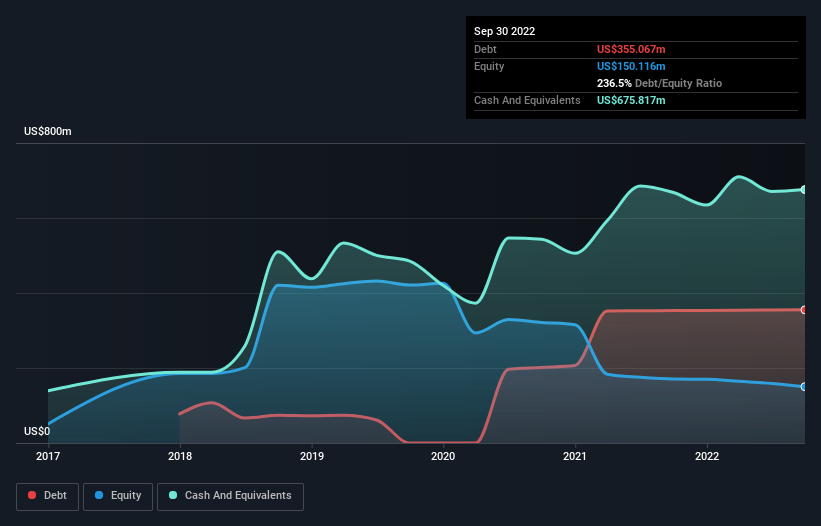
David Iben put it well when he said, 'Volatility is not a risk we care about. What we care about is avoiding the permanent loss of capital.' It's only natural to consider a company's balance sheet when you examine how risky it is, since debt is often involved when a business collapses. As with many other companies Eventbrite, Inc. (NYSE:EB) makes use of debt. But the more important question is: how much risk is that debt creating?
When Is Debt A Problem?
Debt assists a business until the business has trouble paying it off, either with new capital or with free cash flow. In the worst case scenario, a company can go bankrupt if it cannot pay its creditors. However, a more usual (but still expensive) situation is where a company must dilute shareholders at a cheap share price simply to get debt under control. Of course, plenty of companies use debt to fund growth, without any negative consequences. When we think about a company's use of debt, we first look at cash and debt together.
View our latest analysis for Eventbrite
What Is Eventbrite's Net Debt?
As you can see below, Eventbrite had US$355.1m of debt, at September 2022, which is about the same as the year before. You can click the chart for greater detail. However, it does have US$675.8m in cash offsetting this, leading to net cash of US$320.8m.

A Look At Eventbrite's Liabilities
We can see from the most recent balance sheet that Eventbrite had liabilities of US$414.1m falling due within a year, and liabilities of US$367.4m due beyond that. On the other hand, it had cash of US$675.8m and US$3.76m worth of receivables due within a year. So its liabilities outweigh the sum of its cash and (near-term) receivables by US$101.9m.
Of course, Eventbrite has a market capitalization of US$585.2m, so these liabilities are probably manageable. However, we do think it is worth keeping an eye on its balance sheet strength, as it may change over time. While it does have liabilities worth noting, Eventbrite also has more cash than debt, so we're pretty confident it can manage its debt safely. There's no doubt that we learn most about debt from the balance sheet. But ultimately the future profitability of the business will decide if Eventbrite can strengthen its balance sheet over time. So if you want to see what the professionals think, you might find this free report on analyst profit forecasts to be interesting.
Over 12 months, Eventbrite reported revenue of US$249m, which is a gain of 62%, although it did not report any earnings before interest and tax. Shareholders probably have their fingers crossed that it can grow its way to profits.
So How Risky Is Eventbrite?
Although Eventbrite had an earnings before interest and tax (EBIT) loss over the last twelve months, it generated positive free cash flow of US$5.7m. So taking that on face value, and considering the net cash situation, we don't think that the stock is too risky in the near term. The good news for Eventbrite shareholders is that its revenue growth is strong, making it easier to raise capital if need be. But that doesn't change our opinion that the stock is risky. The balance sheet is clearly the area to focus on when you are analysing debt. But ultimately, every company can contain risks that exist outside of the balance sheet. Be aware that Eventbrite is showing 1 warning sign in our investment analysis , you should know about...
If you're interested in investing in businesses that can grow profits without the burden of debt, then check out this free list of growing businesses that have net cash on the balance sheet.
Valuation is complex, but we're here to simplify it.
Discover if Eventbrite might be undervalued or overvalued with our detailed analysis, featuring fair value estimates, potential risks, dividends, insider trades, and its financial condition.
Access Free AnalysisHave feedback on this article? Concerned about the content? Get in touch with us directly. Alternatively, email editorial-team (at) simplywallst.com.
This article by Simply Wall St is general in nature. We provide commentary based on historical data and analyst forecasts only using an unbiased methodology and our articles are not intended to be financial advice. It does not constitute a recommendation to buy or sell any stock, and does not take account of your objectives, or your financial situation. We aim to bring you long-term focused analysis driven by fundamental data. Note that our analysis may not factor in the latest price-sensitive company announcements or qualitative material. Simply Wall St has no position in any stocks mentioned.
About NYSE:EB
Eventbrite
Operates a two-sided marketplace that provides self-service ticketing and marketing tools for event creators in the United States and internationally.
Undervalued with adequate balance sheet.

